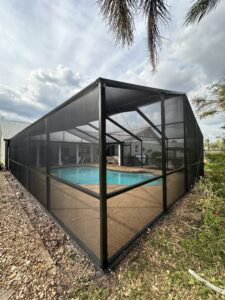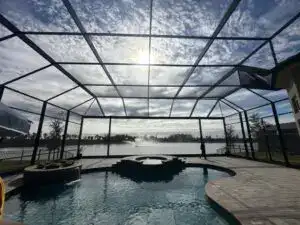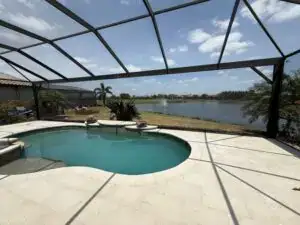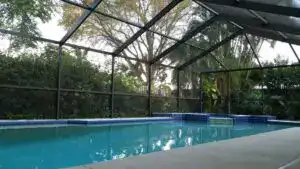When selecting materials for a durable and long-lasting pool screen enclosure, consider options like aluminum, wooden enclosures, fiberglass screens, super-strength polyester screens, and various glazing materials. Aluminum is lightweight and resistant to corrosion, ensuring longevity with minimal maintenance, making it a great choice for a screen enclosure. Wooden options offer natural aesthetics and excellent thermal insulation, although they require regular upkeep. Fiberglass screens are affordable and flexible, while super-strength polyester screens provide greater durability, lasting up to 15 years. Finally, glazing materials enhance insulation and safety features, ensuring that your pool screen enclosure performs well over time. Explore these materials further to find the best fit for your pool enclosure needs.
Key Takeaways
- Aluminium offers exceptional resistance, lightweight properties, and corrosion resistance, making it ideal for durable and low-maintenance pool enclosures.
- Wooden enclosures provide natural aesthetics and excellent thermal insulation, enhancing comfort and extending the swimming season with regular maintenance.
- Fiberglass screens are an affordable option, providing good visibility and airflow while keeping insects out but may lack long-term durability.
- Super-strength polyester screens feature thicker fibers for greater resistance to wear, offering a lifespan of 10 to 15 years for active lifestyles.
- Glazing materials like tempered and laminated glass enhance safety and energy efficiency, improving the overall experience of pool enclosures.
Aluminium, light and resistant
Aluminium, a durable material, stands out as a premier choice for pool enclosures due to its exceptional resistance and lightweight properties. This material’s inherent strength makes it ideal for constructing durable pool cages that can withstand various environmental challenges.
Whether you’re considering a stationary or retractable design, aluminium‘s versatility allows for customizable outdoor enclosures that seamlessly blend functionality with aesthetics.
One of the major advantages of aluminium is its lightweight nature, making installation and manual operation considerably easier. Homeowners seeking freedom in their outdoor spaces will appreciate how effortlessly aluminium enclosures can be operated, enhancing their enjoyment of the pool area patio.
Additionally, the material’s resistance to corrosion guarantees longevity, reducing the need for frequent replacements—an essential consideration when evaluating pool enclosure materials.
While aluminium does offer limited thermal insulation compared to alternatives like wood, its durability and low maintenance requirements make it an attractive option.
To maximize the lifespan of an aluminium pool enclosure, homeowners should follow simple maintenance tips, such as regular cleaning to prevent dirt buildup and periodic inspections for any signs of wear.
Wooden pool enclosure, stylish and insulating
A wooden pool enclosure offers a unique blend of style and functionality, making it an attractive choice for homeowners seeking to enhance their outdoor spaces. The natural aesthetic of wood complements various architectural styles, creating a warm and inviting atmosphere that can elevate any backyard.
Beyond its visual appeal, a wooden enclosure provides excellent thermal insulation, allowing for a longer swimming season and greater comfort while enjoying your pool.
While the initial investment for a wooden pool enclosure may be higher than other materials, such as aluminum or PVC, its long-term benefits can be significant. The insulation properties help maintain water temperature, reducing heating costs and extending your pool’s usability.
Additionally, quality wood, when properly treated and maintained, can last for many years, making it a sustainable choice.
However, potential buyers should be aware that wooden enclosures require regular maintenance to protect against humidity and weather-related wear. This includes periodic sealing, staining, or painting to preserve its integrity and appearance.
The lifespan of a wooden enclosure largely depends on the quality of the wood and the care it receives, emphasizing the importance of choosing high-quality materials and committing to ongoing upkeep.
Fiberglass Screens

Fiberglass screens provide an affordable and flexible option for pool enclosures, making them a popular choice among homeowners.
These screens, crafted from woven fiberglass mesh and coated for enhanced corrosion resistance, offer a practical solution that balances cost and functionality. With a lifespan of 7 to 10 years, they are particularly appealing for those seeking a temporary yet effective enclosure.
One of the standout features of fiberglass screens is their ability to maintain good visibility and airflow. This aspect allows homeowners to enjoy the beauty of their surroundings while keeping insects and debris at bay, fostering a sense of openness and freedom.
However, potential buyers should be aware that these screens can be prone to wear and tear, especially in areas subjected to high winds or intense UV exposure.
While fiberglass screens are lightweight and easy to install, it’s important to reflect on their limitations. In high-demand environments, such as homes with active children or pets, they may not offer the same durability as some other materials.
Nevertheless, for those who prioritize budget and flexibility, fiberglass remains an excellent choice.
Super-Strength Polyester Screens
Super-strength polyester screens provide a robust solution for pool enclosures, particularly appealing to homeowners with active lifestyles.
These screens are crafted from thicker fibers, giving them a lifespan of 10 to 15 years, which considerably outlasts traditional fiberglass options. Their durability makes them an excellent choice for families with pets or children who may inadvertently test the limits of typical screen materials.
One of the standout features of super-strength polyester screens is their resistance to tears, stretching, and sagging. This strength allows for uninterrupted enjoyment of your pool area, providing a safe, comfortable environment without the constant worry of damage from rough play.
The initial investment may be higher compared to other screening materials, but the long-term cost-effectiveness is undeniable, as their longevity reduces the need for frequent replacements.
Additionally, these screens maintain good visibility and airflow, ensuring that your outdoor space remains open and inviting. Homeowners can relish the freedom of enjoying their pools without compromising on safety or aesthetics.
Super-strength polyester screens are designed to withstand the elements, making them suitable for various climates and conditions.
Glazing Materials Comparison
When selecting glazing materials for pool enclosures, understanding the various options available is essential for achieving ideal performance and aesthetic appeal. The choice of glazing greatly impacts energy efficiency, safety, and overall comfort of the enclosure.
Among the most common types are single, double, and triple glazing, each offering distinct advantages. Single glazing is the most basic option, providing minimal insulation, while double glazing enhances energy efficiency, making it a popular choice for pool enclosures.
For those in extreme climates, triple glazing offers superior insulation but at a higher cost. Laminated glass, featuring a PVB interlayer, is a preferred safety option, as it holds glass shards together upon breakage, reducing injury risk.
Tempered glass, known for its strength and shatter resistance, also complies with safety regulations, making it suitable for high-traffic areas. Low-E glass reflects heat, improving energy efficiency and reducing energy costs, while tinted glass minimizes glare and heat gain, creating a more comfortable environment.
Insulated glazing, utilizing multiple layers with gas-filled gaps, enhances thermal performance, reduces condensation, and improves sound insulation. Each glazing material varies regarding longevity and maintenance needs.
Understanding these options allows homeowners to select the glazing that aligns with their vision for a durable and stylish pool enclosure, ensuring a safer, more enjoyable experience in their outdoor space.
Frequently Asked Questions
What Are the Installation Costs for Different Pool Enclosure Materials?
Installation costs for pool enclosure materials vary considerably based on factors such as material choice, size, and complexity. Generally, aluminum is more cost-effective, while wood and glass may incur higher expenses due to material quality and installation intricacies.
How Do Weather Conditions Affect Each Material’s Performance?
Weather conditions greatly impact materials used for pool enclosures. For instance, extreme temperatures can weaken wood, while UV exposure may degrade PVC. Aluminium and stainless steel offer enhanced durability, resisting corrosion and maintaining structural integrity under harsh climates.
Can I Paint or Customize the Enclosure Materials?
Yes, enclosure materials can be painted or customized, provided appropriate coatings are used. This enhances aesthetic appeal while maintaining structural integrity. Confirm that any modifications comply with manufacturer guidelines to avoid compromising durability and performance.
What Are the Environmental Impacts of Each Material?
Each material used in pool enclosures presents distinct environmental impacts, including resource extraction, manufacturing processes, and end-of-life disposal. Sustainable choices, such as recyclable materials, can mitigate these impacts while promoting environmental responsibility and aesthetic appeal.
How Do I Choose the Right Material for My Location?
To select the appropriate material for your location, consider climate conditions, aesthetic preferences, maintenance requirements, and durability. Evaluate each option’s resistance to environmental factors, ensuring your choice aligns with your lifestyle and desired freedom of use.








